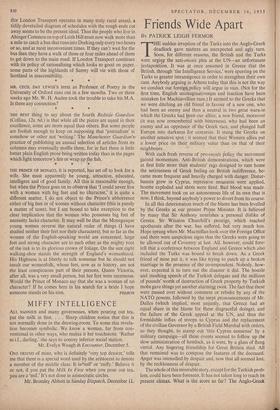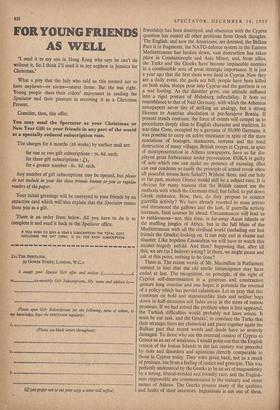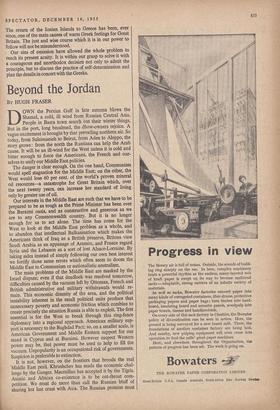Friends Wide Apart
BY PATRICK LEIGH FERMOR THE sudden irruption of the Turks into the Anglo-Greek deadlock gave matters an unexpected and ugly turn. Soon, for different reasons, the British and the Turks were urging the anti-enosis plea at the UN—an unfortunate juxtaposition. It was at once assumed in Greece that the British, through 'the Intelligence Service,' were spurring on the Turks to greater intransigence in order to strengthen their own case. Anybody arguing in Athens today that this is not the way we conduct our foreign, policy will argue in vain. (Not for the first time, English unimaginativeness and inaction have been mistaken for Machiavellian ruse.) It seemed to the Greeks that we were ditching an old friend in favour of a new one, who had been an enemy and then a neutral in two great wars. in which the Greeks had been our allies; a new friend, moreover (it was now remembered with bitterness), who had been an enemy and an oppressor of the Greek race, and plunged half Europe into darkness for centuries. It stung the Greeks on another sensitive spot : it seemed that their Western allies put a lower price on their military value than on that of their neighbours.
With each fresh reverse of pro-enosis iolicy the movement gained momentum. Anti-British demonstrations, which were at first little more than students' rags designed to ram home the seriousness of Greek feeling on British indifference, be- came more frequent and heavily charged with danger. Distur- bances grew in Cyprus, repressive measures were applied, bombs exploded and shbts were fired. Bad blood was made. The movement took on an autonomous life of its own that is now, I think, beyond anybody's power to divert from its course.
In all this deterioration much of the blame has been levelled by the Greeks at our present Prime Minister. It is believed by Many that Sir Anthony nourishes a personal dislike of Greece. Sir Winston Churchill's prestige, which reached apotheosis after the war, has suffered, but very much less. Hope sprang when Mr. Macmillan took over the Foreign Office and there were auspicious signs that the Greeks were going to be allowed out of Coventry at last. All, however, could fore- tell that a conference between England and Greece which also included the Turks was bound to break down. As a Greek friend of mine put it, it was like trying to patch up a broken marriage in the presence of the co-respondent. Nobody, how- evet, expected it to turn out the disaster it did. The hostile and insulting speech of the Turkish delegate and the millions of pounds' worth of destruction of Greek property by Turkish mobs gave things yet another alarming twist. The fact that these were passed over without comment or rebuke by any of the NATO powers, followed by the inept pronouncements of Mr. Dulles (which implied, most unjustly, that Greece had an equal share in the blame for these disgraceful doings), and the failure of the Greek appeal at the UN, and then the formidable influx of troops to Cyprus and the replacement of the civilian Governor by a British Field Marshal with orders, so they thought. to stamp out 'this Cyprus nonsense' by a military campaign—all these events seemed to follow up the slow administration of hemlock, as it were, by a glass of flung vitriol. Any lingering friendship for Great Britain died. All that remained was to compose the features of the deceased. Anger was intensified. by despair and, now that all seemed lost, by the recklessness of despair.
The whole of this miserable story, except for the Turkish prob- lem, could have been foreseen. It has not taken long to reach its present climax. What is the score so far? The Anglo-Greek friendship has been destroyed, and obsession with the Cyprus question has ousted all other problems from Greek thoughts. The English, and now the Americans, are detested, the Balkan Pact is in fragments, the NATO defence system in the Eastern Mediterranean has broken down, vast destruction has taken place in Constantinople and Asia Minor, and, from allies, the Turks and the Greeks have become implacable enemies in a combustible area of great strategic importance. It is just a year ago that the first shots were fired in Cyprus. Now they arc a daily event, the gaols are full, people have been killed on both sides, troops pour into Cyprus and the garrison is on a war footing. As the disorder grew, our attitude stiffened into a rigid posture of Habsburg inflexibility. It bore no resemblance to that of Nazi Germany, with which the Athenian newspapers never tire of striking an analogy, but a strong likeness to Austrian absolutism in pre-Sarajevo Bosnia. If present trends continue, the force of events will compel us to procedures deeply alien to English character and tradition. In war-time Crete, occupied by a garrison of 50,000 Germans, it was possible to carry on active resistance in spite of the mass executions of hostages, massacres, tortures and the total destruction of many villages. British troops in Cyprus, in spite of misrepresentation in Athens newspapers, have so far dis- played great forbearance under provocation. EOKA is guilty of acts which one can make no pretence of excusing. (But can one condemn so easily the principle of armed revolt when all peaceful means have failed?) Without them, and our help in the past, modern Greece would still be a subject race. It is obvious for many reasons that the British cannot use the methods with which the Germans tried, but failed, to put down Greek resistance. How, then, do they propose to counter guerrilla activity? We have already resorted to mass arrests and threatened the gallows and the lash. If guerrilla activity increases, fatal courses lie ahead. Circumstances will lead us to ruthlessness—not, this time, in far-away Asian islands or the muffling jungles of Africa. but in the full blaze of the Mediterranean with all the civilised world (including our lost friends the Greeks) looking on. It can only end in shame and disaster. Like hopeless Cassandras we will have to watch this sinister tragedy unfold. And then? Supposing that, after all this, we are (as I believe) wrong? Is there, we might pause and ask at this point. nothing to be done?
There is. The recent words of Mr. Macmillan in Parliament seemed to hint that the old sterile intransigence may have ended at last. The recognition, on principle, of the right of Cypriot self-determination is a generous and constructive gesture long overdue and one hopes it portends the reversal of a policy which has proved calamitous. Let us pray that this continues on bold and statesmanlike lines and neither bogs down in half-measures nor fades away in the mists of remote promises. If we had solved the problem when it first appeared, the Turkish difficulties would probably not have arisen. It must be our task, and the Greeks', to convince the Turks that their strategic fears are chimerical and piece together again the Balkan pact that recent words and deeds have so severely damaged. To those who see the eventual cession of Cyprus to Greece as an act of weakness, I would point out that the English cession of the Ionian Islands in the last century was preceded by riots and disorders and agitations directly comparable to those in Cyprus today. They were given back, not as a result of pressure, but from a feeling of justice and principle. This was perfectly understood by the Greeks to be an act of magnanimity by a strong, liberal-minded and friendly race, and the English- men responsible are commemorated in the statuary and street names of Athens. The Greeks possess many of the qualities and faults of their ancestors. ingratitude is not one of them. The return of the Ionian Islands to Greece has been, ever since, one of the main causes of warm Greek feelings for Great Britain. The just and wise course which it is in our power to follow will not be misunderstood.
Our sins of omission have allowed the whole problem to reach its present acuity. It is within our grasp to solve it with a courageous and unorthodox decision not only to admit the principle, but to discuss the practice of self-determination and plan the details in concert with the Greeks.




































 Previous page
Previous page